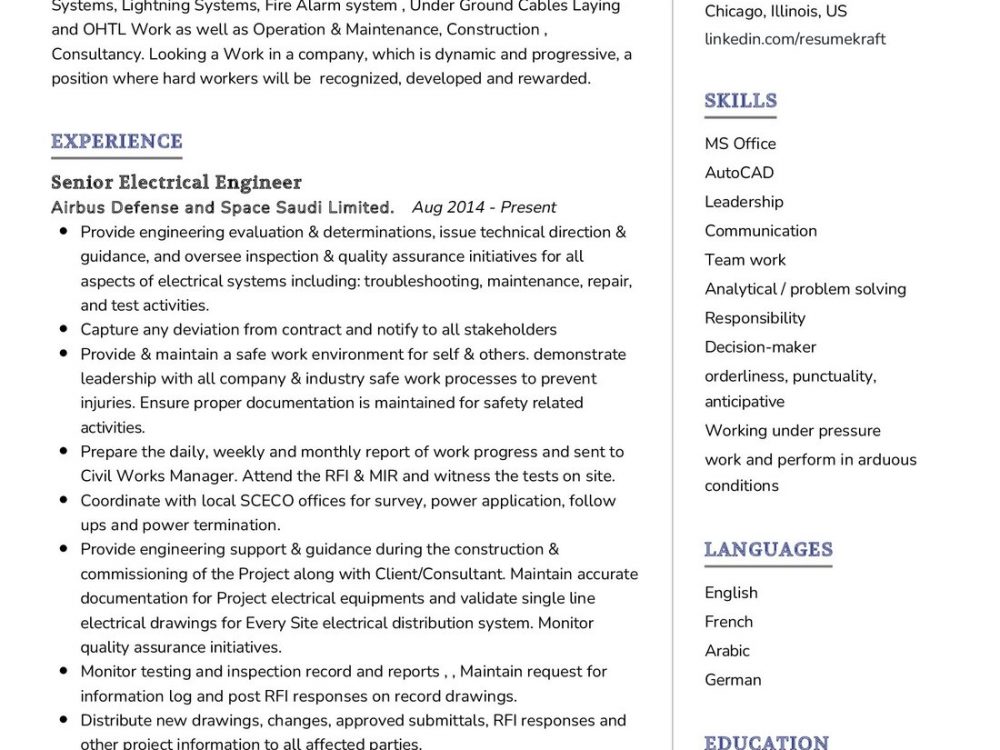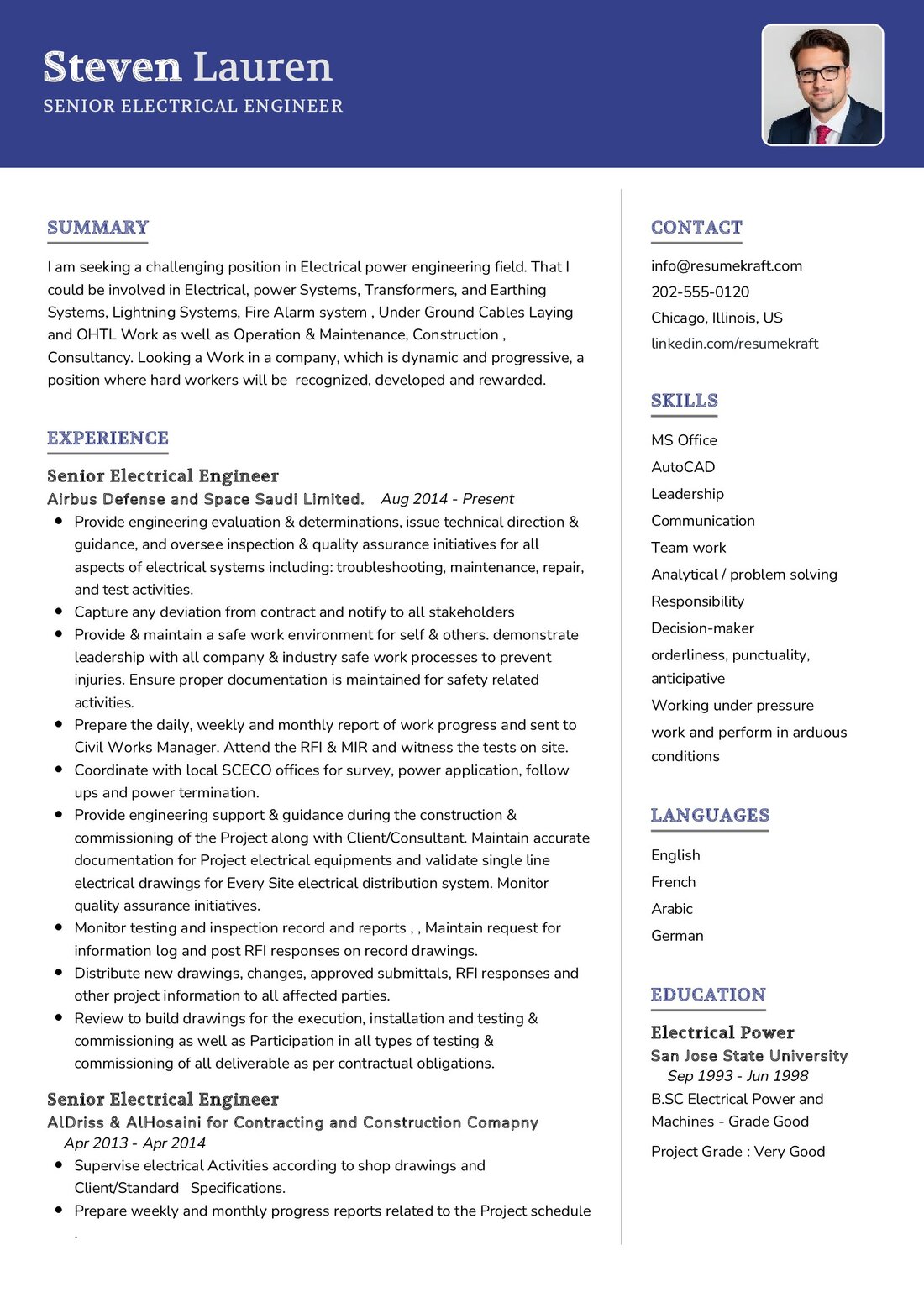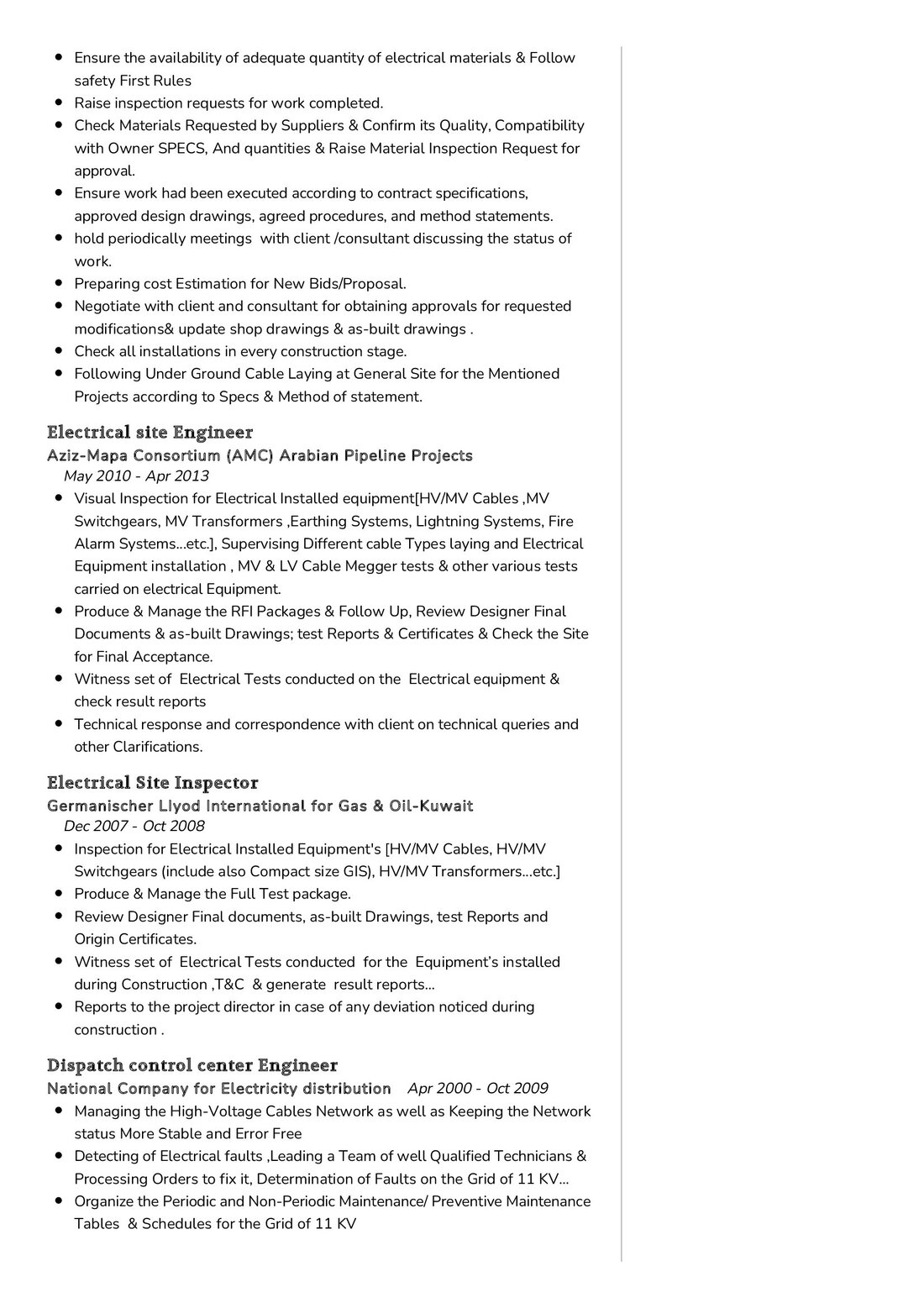What is the Role of a Senior Electrical Engineer?
In the ever-evolving landscape of technology and innovation, the role of a Senior Electrical Engineer has emerged as a cornerstone of progress in various industries. This position amalgamates technical expertise with leadership skills, playing a vital role in overseeing and managing complex electrical engineering projects. Let’s delve deeper into the multifaceted role of a Senior Electrical Engineer, a position that demands a deep understanding of electrical systems, coupled with the ability to lead and inspire a team effectively.
A Senior Electrical Engineer is tasked with the responsibility of spearheading electrical engineering projects, ensuring the seamless integration of electrical systems into various infrastructures. They play a pivotal role in not only designing and implementing these systems but also in managing and overseeing the entire project lifecycle. Their expertise is crucial in ensuring that electrical systems are not only functional but also compliant with industry standards and regulations, thereby contributing significantly to the overall success of the projects they undertake.
What are the Senior Electrical Engineer Job Requirements?
To step into the role of a Senior Electrical Engineer, one must meet stringent requirements that testify to their proficiency and experience in the field. Below are the prerequisites necessary to assume the responsibilities of a Senior Electrical Engineer:
- A Bachelor’s or Master’s degree in Electrical Engineering, showcasing a strong foundation in the field.
- Extensive knowledge of electrical design principles and their practical applications in various industries.
- Proven experience in managing and overseeing large-scale electrical engineering projects, demonstrating the ability to handle complex technical challenges effectively.
- Exceptional leadership and communication skills, honed through experiences and possibly through relevant training and certifications.
- Proficiency in utilizing industry-standard software for electrical design and analysis, such as AutoCAD, MATLAB, and SolidWorks, among others.
- Ability to work in a team and collaborate with professionals from various disciplines, fostering a conducive and collaborative work environment.
Obtaining additional certifications in specialized areas of electrical engineering can further enhance one’s profile and competitiveness in the job market.
What are the Responsibilities of a Senior Electrical Engineer?
The role of a Senior Electrical Engineer encompasses a wide array of responsibilities that require a blend of technical expertise, critical thinking, and effective management skills. Let’s explore the key responsibilities that define this role, each contributing to the successful execution of electrical engineering projects and the overall progress of the organization:
- Leading the design and development of electrical systems, ensuring they meet the required specifications and standards.
- Overseeing the implementation and integration of electrical systems into various projects, ensuring seamless functionality and compatibility.
- Collaborating with cross-functional teams to ensure that electrical systems align with the overall project objectives and requirements.
- Conducting thorough analyses and assessments to identify potential risks and challenges in electrical systems, implementing effective mitigation strategies.
- Mentoring and guiding junior engineers, fostering a culture of knowledge sharing and continuous learning within the team.
- Ensuring compliance with all safety regulations and industry standards, prioritizing the safety and well-being of all stakeholders involved in the project.
- Staying updated with the latest advancements and trends in electrical engineering, integrating innovative solutions into ongoing and future projects.
Each responsibility requires a high level of expertise, diligence, and strategic thinking to ensure the successful execution of projects.
Senior Electrical Engineer CV Writing Tips
When crafting your CV as a Senior Electrical Engineer, it is crucial to highlight your expertise, experiences, and achievements effectively. Here are some tips to help you create a compelling CV:
- Emphasize your leadership skills, showcasing instances where you successfully led and managed complex electrical engineering projects.
- Highlight specific projects you have spearheaded, elucidating the impact they had on the organizations and industries you worked in.
- Use metrics to quantify your accomplishments, providing a clear picture of the results you achieved through your work.
- Include relevant certifications and training programs, showcasing your commitment to continuous learning and professional development.
- Customize your CV for specific job applications, ensuring that it reflects the requirements and expectations outlined in the job description.
Each tip is a valuable tool in crafting a compelling CV that effectively communicates your expertise and suitability for the role of a Senior Electrical Engineer.
Senior Electrical Engineer CV Summary Examples
Your CV summary is a crucial aspect that provides a snapshot of your career journey and highlights your key strengths and contributions. Here are some examples to inspire you in crafting an impactful CV summary:
- “Results-driven Senior Electrical Engineer with over 15 years of experience in leading and managing complex electrical engineering projects, adept at delivering innovative solutions and ensuring project success.”
- “Dedicated Senior Electrical Engineer with a proven track record of implementing cutting-edge electrical systems, a strategic thinker who has successfully overseen various large-scale projects in the industry.”
- “Experienced Senior Electrical Engineer with a specialization in designing and integrating sustainable electrical solutions, a leader fostering a collaborative and forward-thinking approach within project teams.”
Each summary serves as a gateway to your career, showcasing your expertise and accomplishments as a Senior Electrical Engineer.
Create a Strong Experience Section for Your Senior Electrical Engineer CV
Your experience section is the crux of your CV, providing detailed insights into the projects you have undertaken and the impact you have made throughout your career. Here are some examples to guide you in creating a robust experience section:
- “Led the design and implementation of electrical systems for a major infrastructure project, contributing to a 25% increase in energy efficiency and cost savings.”
- “Oversaw the integration of renewable energy solutions into a commercial building, resulting in a significant reduction in carbon footprint and operational costs.”
- “Mentored and guided a team of junior engineers in the successful execution of a complex electrical project, fostering a culture of innovation and excellence within the team.”
Each experience serves as a testament to your expertise, leadership, and the significant contributions you have made throughout your career as a Senior Electrical Engineer.
Sample Education Section for Your Senior Electrical Engineer CV
Your educational background is a cornerstone of your expertise and credibility as a Senior Electrical Engineer. Here’s how you can effectively showcase your educational milestones:
- Master of Science in Electrical Engineering, XYZ University, a testament to your advanced knowledge and specialization in the field, 2010.
- Bachelor of Science in Electrical Engineering, ABC University, laying the foundation for your career in electrical engineering, 2006.
- Certified Professional Engineer (PE), a recognition of your expertise and credibility in the field of electrical engineering, 2012.
Each educational qualification serves as a testament to your dedication, expertise, and continuous commitment to professional development as a Senior Electrical Engineer.
Senior Electrical Engineer Skills for Your CV
Your skill set as a Senior Electrical Engineer is a reflection of your technical prowess, problem-solving abilities, and leadership skills. Let’s outline the key skills that a Senior Electrical Engineer should possess:
Soft Skills:
- Leadership and team management, the ability to lead and inspire teams effectively.
- Communication and interpersonal skills, the aptitude to convey complex technical concepts clearly and build strong professional relationships.
- Critical thinking and problem-solving abilities, the capacity to identify and resolve complex electrical engineering challenges.
- Attention to detail, the diligence to ensure precision and accuracy in all aspects of electrical engineering projects.
- Adaptability and flexibility, the ability to navigate and thrive in dynamic and challenging work environments.
Hard Skills:
- Proficiency in electrical design software, demonstrating your technical competence in utilizing industry-standard tools for electrical engineering projects.
- Expertise in electrical system analysis, a skill that enables you to effectively evaluate and optimize the performance of electrical systems.
- In-depth knowledge of electrical codes and regulations, ensuring compliance and safety in all electrical engineering endeavors.
- Budget and resource management, the capability to effectively manage project resources and adhere to budget constraints.
- Project management expertise, the proficiency to oversee and coordinate all aspects of electrical engineering projects from conception to completion.
Each skill serves as a vital component in your arsenal, enabling you to excel in your role as a Senior Electrical Engineer.
Most Common Mistakes to Avoid When Writing a Senior Electrical Engineer CV
As you compile your CV, it is crucial to steer clear of common pitfalls that can detract from your professional profile. Let’s outline the mistakes often observed in CVs and how to avoid them:
- Avoid using generic language that fails to highlight your unique strengths and contributions as a Senior Electrical Engineer.
- Ensure to emphasize your achievements rather than merely listing job responsibilities, providing tangible evidence of your impact in previous roles.
- Do not overlook the importance of a cover letter, as it offers a valuable opportunity to convey your passion and enthusiasm for the role.
- Avoid using excessive technical jargon that may confuse or alienate readers who are not familiar with specific electrical engineering terms.
- Always proofread your CV to eliminate any spelling or grammatical errors, ensuring a polished and professional presentation of your credentials.
Each mistake has the potential to undermine the effectiveness of your CV, so it is crucial to avoid these pitfalls to present yourself as a strong candidate for the role of a Senior Electrical Engineer.
Key Takeaways for Your Senior Electrical Engineer CV
As we conclude this comprehensive guide, it is essential to remember the key elements that can elevate your Senior Electrical Engineer CV and set you apart from other candidates:
- Highlight your leadership capabilities and successful project management experiences, emphasizing your ability to deliver results and lead teams effectively.
- Showcase your technical proficiency and in-depth understanding of electrical engineering principles, underscoring your ability to handle complex engineering challenges with precision and expertise.
- Detail the strategic initiatives you have spearheaded, providing concrete examples of how your innovative approach has contributed to the success of electrical engineering projects.
- Include a section dedicated to continuous learning, featuring certifications and training programs that reflect your commitment to professional development and staying updated with the latest industry trends and advancements.
Finally, take advantage of resources like AI CV Builder, CV Design, CV Samples, CV Examples, CV Skills, CV Help, CV Synonyms, and Job Responsibilities to create an impressive application and prepare for the Senior Electrical Engineer job interview.



